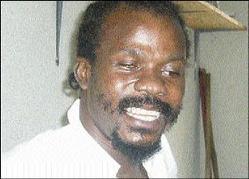Paul H. Williams, Gleaner Writer


Pellington
In 1995, the path on which 19-year-old Errington Pellington was treading was good, but in a world full of twists, turns and detours, he didn't know what was down the road. As he merrily went along the way, the course of his life was about to be changed in a jiffy, for better or for worse.
He was making his own money by selling a variety of goods all over Kingston and St. Andrew. The young, free spirited man had jumped at every opportunity to make some sales.
His mother Una Samuels had a zest for entrepreneurism and so when he failed to finish secondary school, 'business' was the logical thing for Pellington to pursue.
However, it wasn't all about work for the Central Branch All-Age School graduate. The boy had to have some fun. Going to dances and clubs was one of his many pastimes. But, as he walked along Cargill Avenue on the morning of October 22, 1995, on his way from a session at The House Leo, his dreams of owning a 'big car' and a 'big house' were deferred.
About three men approached him, robbed him of his jewellery and took him to Balmoral Avenue, apparently to kill him. At the point where Skibo and Balmoral avenues meet, an unmarked car drove towards them from the north. Men armed with powerful weapons alighted and opened fire. Pellington fell as the robbers fled. He was shot. He said the armed men, who, he then realised werepolicemen, stood over him in his dazed state, pointing their guns at him. He said one of them said, "Shoot the?) boy, him no get no shot."
Though about my family
Pellington said he lay on the ground feeling "very heavy" as he thought about his family.
"I was saying to myself 'I gwine dead'. Being the spiritual individual that I am, I started to reflect on my family within the eye-closing moments, hoping that I pull through to see them again."
The police eventually tossed the semi-conscious youth into their vehicle and took him to a police station. He said they kept him for about two hours before taking him to the Kingston Public Hospital. When he was waiting for attention in the emergency room, Pellington said a policeman punched him in his belly, while accusing him of shooting his colleague. A doctor had to ask the policeman to leave.
Pellington was taken to a ward, where he was handcuffed to a bed in a section where he was isolated. Soon after, on his hospital bed, he was charged with shooting with intent, illegal possession of firearm and robbery with aggravation. He was placed under police guard. The following day, there was a report in a newspaper saying he was a gunman wounded in a shoot-out.
Given bail
His family retained the services of attorney-at-law Bert Samuels, and he was subsequently given bail. But, that was little reprieve for Pellington. The bullet that entered through his right upper side had damaged his spine. He was told by doctors that he wasparalysed from the waist down. He didn't believe them.
"At the time, what went through my mind was that the doctor was talking crap ... He's not God. How this man fi come tell mi say mi nah goh walk again?"
The four months he spent in hospital, despite the support from family and friends, was hell on Earth. "I couldn't move, couldn't do anything. I had punctured lungs; I had pressure [bed] sores. I had marks on my legs to show where roaches eat me up, marks on my foot to show where my heel rested on thebed," he said.
He went home in wheelchair from the hospital to a grand welcome by neighbours and friends, and he realised that his life would never be the same again.
At home, he started to have several complications: pressure sores, constant infections and weight loss. "I was depressed to know that I was confined like a prisoner in my own house."
After months of follow-up visits to the hospital, he was sent to the Mona Rehabilitation Centre for therapy. The experience at the centre significantly changed his attitude and morale as he saw persons who were in a worse situation than he was helping themselves.
After about three months at the 'Mona Rehab', it was more medical procedures and hardship, as he struggled to adapt to his new life, a frustrating one.
However, it was his experience when he sought help that really turned his life around. In his search, he found there was no organisation specifically set up to tend to the financial and material needs of paraplegics. He was given the run-around time and time again. About 1999, he got an idea to set up such an organisation. He pitched it to Ransford Wright, executive director of the Jamaica Council for Persons with Disabilities (JCPD), who referred him to Dr. Wendel Abel, noted psychiatrist.
Out of discussions with Dr. Abel, and some other persons with disability, the Paraplegic Development and Outreach Foundation (PARADOF) was born, to alleviate the conditions faced by persons with disabilities.
But before PARADOF could be registered, there had to be a building. Space, at 92 Hanover Street, downtown Kingston, where the JCPD was once located, was identified.
Getting help for structure
The JCPD aided PARADOF in getting the initial structure, which was refurbished by the United States Agency for International Development and the Kiwanis Club of North St. Andrew.
In April 2001, PARADOF was registered as a non-governmental organisation with Pellington as its founder and director, and Dr. Abel, its chairman,
Although Pellingtonis satisfied, PARADOF is not the end of the road for this enterprising 31-year-old music producer. "I hope that I can achieve the best, produce some of the best music, write some of the best songs, write some books, direct movies and continue to help people with disabilities."
He continued: "As long as I can help someone I know within myself I can sleep good," said the man who wants to father many children.
paul.williams@gleanerjm.com

